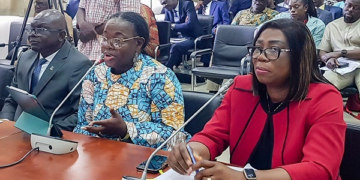The 2021 Auditor General’s Report has revealed that the University of Ghana, Legon, is running 371 unaccredited programmes, including 80 undergraduate courses. The unaccredited programmes also include 213 postgraduate and 67 Doctor of Philosophy (PhD) courses.
Following suit, officials from the Kwame Nkrumah University of Science and Technology (KNUST) also appeared before the Public Accounts Committee of Parliament, acknowledging that their institution was running unaccredited programs as well.
During the committee hearing held in Accra, Mrs Emelia Agyei-Mensah, the Registrar of the University of Ghana, clarified that 60 undergraduate programs had been fully accredited. She further assured the committee that the university had implemented measures to ensure that all remaining unaccredited courses would undergo the necessary accreditation process successfully.
When questioned about the issuance of certificates for students enrolled in these unaccredited programs, Mrs Agyei-Mensah confirmed that certificates were indeed provided once the programs were launched. However, she emphasized the university’s commitment to ensuring that all programs meet accreditation requirements.
The Vice-Chancellor of KNUST, Prof. Rita Akosua Dickson, expressed the efforts made by the university to address accreditation challenges. She highlighted the close collaboration between KNUST and the Ghana Tertiary Education Commission, emphasizing the regular exchange of data and the utilization of technology to resolve the problem. Prof. Dickson also mentioned the regulator’s plan to develop an electronic app to streamline and automate accreditation processes.
The Auditor General’s Report also shed light on financial mismanagement at the University of Ghana. It revealed that over GH¢1.23 million from the institution’s Research and Development Fund had been invested in a private investment firm, contrary to a circular issued by the Vice-Chancellor. The circular had explicitly stated that such investments should only be made in commercial banks meeting specific criteria. The Director of Finance at the time reportedly disregarded this directive and invested the funds with NDK Financial Services. Presently, only GH¢100,000 has been recovered from this investment.
Bernice B. Agudu, the current Director of Finance, explained the situation to the committee, clarifying that the investment had taken place in 2017, before her tenure, and that the Vice-Chancellor’s directive was issued four years later. She acknowledged that NDK Financial Services faced liquidity challenges and assured the committee that the university’s legal team was diligently working to recover the remaining amount.

































